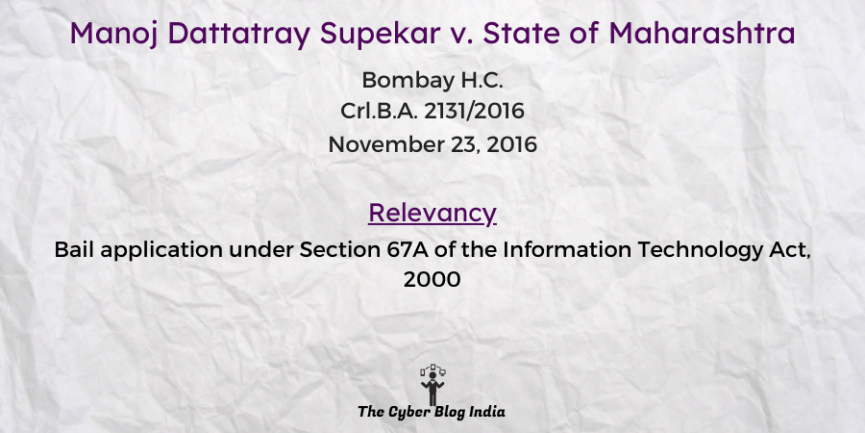Manoj Dattatray Supekar v. State of Maharashtra

Manoj Dattatray Supekar v. State of Maharashtra
In the High Court of Bombay
Crl.B.A. 2131/2016
Before Justice Sadhana S Jadhav
Decided on November 23, 2016
Relevancy of the case: Bail application under Section 67A of the Information Technology Act, 2000
Statutes and Provisions Involved
- The Information Technology Act, 2000 (Section 67A)
- The Indian Penal Code, 1860 (Sections 376, 292, 506)
- The Code of Criminal Procedure, 1973 (Section 439)
Relevant Facts of the Case
- The victim (first informant) lodged a report at the police station alleging that the applicant, a friend of her husband’s, visited her house often and solicited sexual favours from her threatening her of dire consequences if she denied him.
- Her husband learnt about the intimacy and asked her to leave her matrimonial house. She was staying with her parents.
- The applicant continued to visit her at her maternal house.
- One day, the applicant threatened to kill her son and, under this threat, took her to Shirdi, where they had sexual intercourse.
- According to the first informant, when they were in Shirdi, the applicant took a video of the sexual act between them and forwarded the clip to her relatives.
- After this incident, she lodged a first information report against the applicant.
- The investigation was completed, and the charge sheet is filed.
Prominent Arguments by the Advocates
- The applicant’s counsel submitted that the applicant was having intimate relations with the first informant and voluntarily left for Shirdi with the applicant. Therefore, Section 376 of the Penal Code, 1860 would not be attracted as consensual sex is apparent on the face of the record. Further, the applicant had informed the first informant’s husband regarding their relationship and provided a memory card containing images of sexual acts between the first informant and the applicant. On this basis, the first informant and her husband had filed a divorce petition seeking divorce by consent.
Opinion of the Bench
- The Court observed that, since the punishment under Section 67A of the Information Technology Act, 2000 is for a term that may extend to 5 years, the applicant deserves to be granted bail.
Final Decision
- Application allowed.
- Bail granted, subject to certain conditions.
This case summary has been prepared by Mehula Liza Pallathu, an undergraduate student at National University of Advanced Legal Studies, Kochi, during her internship with The Cyber Blog India in May/June 2021.
